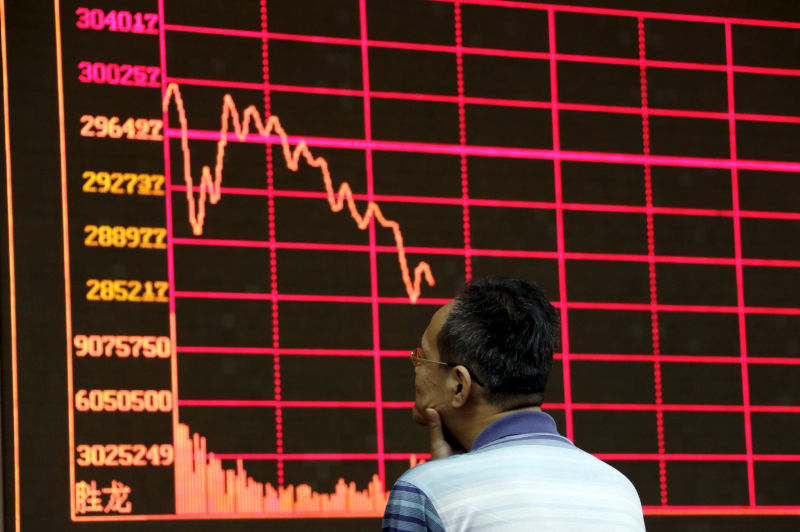China and Hong Kong stocks suffered their worst day since the pandemic-sparked slump in February 2020 on Monday, over growing concerns that the lockdowns in China aimed at fighting a worsening Covid outbreak could seriously harm the country’s economy and global supply chains.
The blue-chip CSI300 index dropped 4.9% to close at a two-year low of 3,814.91, the Shanghai Composite Index plunged 5.1% to 2,928.51 points and the Hang Seng Index fell 3.7%.
Both Chinese indexes have erased all gains made since Vice Premier Liu He’s pledge on March 16 to support the economy and financial markets.
China’s yuan also fell to a one-year low against the dollar, extending losses after posting its worst week since 2015, while a worsening economic growth outlook drove investor concern that the currency could fall more.
Also on AF: Chinese Yuan Slips to One-Year Lows, Extending Losses
Dozens of cities across the country are under either full or partial lockdowns, which have disrupted supply chains, affected economic activities and raised doubts on whether China will be able to reach this year’s growth target of 5.5%.
As Shanghai still grapples with the Covid outbreak amid prolonged strict lockdowns, Beijing began mass testing for all residents of its biggest district, Chaoyang, after dozens of cases were reported, prompting residents to snap up food and other supplies.
“The poor sentiment is because of fear of potential lockdowns which are starting to multiply beyond Shanghai,” said Gary Ng, Asia Pacific Economist at Natixis. “If the situation gets worse and we see more lockdowns that would have more pressure on the equities market.”
The rout came even after it was reported that some Chinese state banks would follow small lenders and cut deposit rate ceilings on Monday. Meanwhile, China’s central bank has repeatedly said it would step up support to the economy and maintain market stability.
Despite frequent pledges, analysts and traders said they were disappointed by the less-than-expected reserve ratio cut and rate reductions, and the key issue is still whether China will loosen its zero-Covid policy, which is worsening its growth outlook.
Shanghai Composite Falls Below 3,000
The Shanghai Composite Index dropped below the key 3,000-point level, a psychological comfort zone for Chinese investors.
The Hang Seng Index plunged 3.73%, or 769.18 points, to 19,869.34 while the Shanghai Composite Index’s 5.13% drop came from a 158.41 points fall, while the Shenzhen Composite Index on China’s second exchange dived 6.48%, or 124.09 points, to 1,790.03.
Most sectors fell, with resource stocks, semiconductors and new energy firms plunging more than 7% to lead the decline.
Banks fell 4.7% as lower deposit rates are expected to hurt their margins, while sentiment was further dented as Chinese President Xi Jinping accelerated a corruption crackdown in the financial sector.
Tokyo Falls on Rate Fears
The picture wasn’t any brighter elsewhere across Asia as Tokyo stocks closed lower too after Wall Street shares plunged on anxiety over higher interest rates.
The benchmark Nikkei 225 index ended down 1.90%, or 514.48 points, at 26,590.78, while the broader Topix index slipped 1.50%, or 28.63 points, to 1,876.52.
Indian stocks also fell, with Mumbai’s signature Nifty 50 index down 1.27%, or 218.00 points, to close at 16,953.95.
Seoul, Singapore, Taipei, Bangkok and Jakarta were also deep in the red, while Sydney and Wellington were closed for holidays.
The sell-offs continued in Europe, with London, Paris and Frankfurt all sharply lower in the morning.
The STOXX 600 index dropped to its lowest since mid-March, led by 2% and 1.9% drops in French and German shares. The euro slid 0.7% to its lowest since the initial bout of Covid panic in March 2020.
MSCI’s broadest index of world shares slid 0.7% to a six-week low and oil fell over 4% in commodity markets.
Much focus is now on how fast and far the Federal Reserve will raise US interest rates this year and whether it will, along with all the other global worries, tip the world economy into recession.
Key figures at 0810 GMT
Tokyo – Nikkei 225 > DOWN 1.9% at 26,590.78 (close)
Hong Kong – Hang Seng Index > DOWN 3.7% at 19,869.34 (close)
Shanghai – Composite > DOWN 5.1% at 2,928.51 (close)
London – FTSE 100: DOWN 1.7% at 7,393.58
Brent North Sea crude > DOWN 4.0% at $102.41 per barrel
West Texas Intermediate > DOWN 4.0% at $97.95 per barrel
New York – Dow > DOWN 2.8% at 33,811.40 (Friday close)
- Reuters with additional editing by Sean O’Meara























